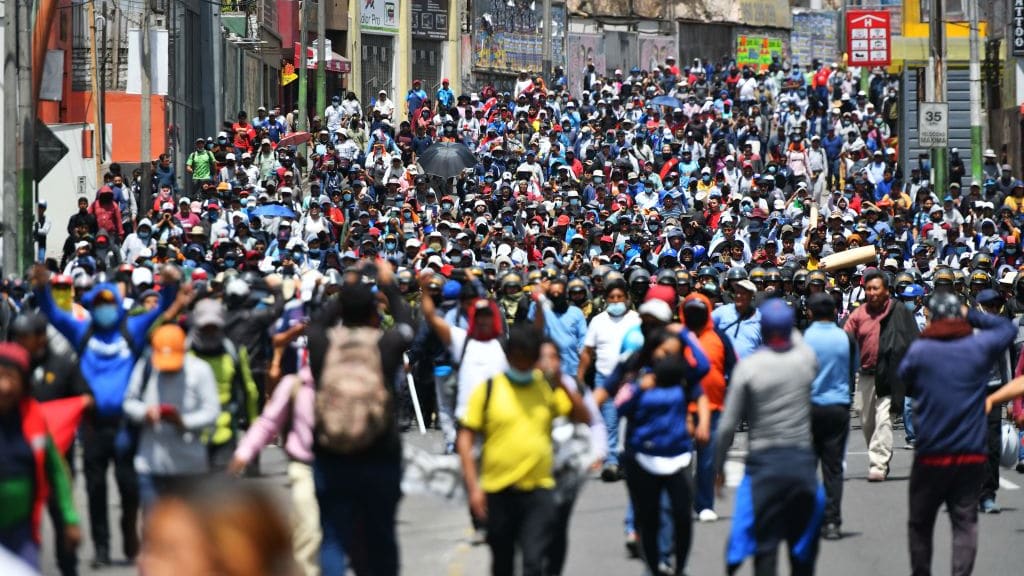State of emergency declared in Peru amid ongoing protests


A free daily email with the biggest news stories of the day – and the best features from TheWeek.com
You are now subscribed
Your newsletter sign-up was successful
A national state of emergency was declared in Peru on Wednesday, one week after former President Pedro Castillo was arrested after being impeached.
Peru's defense minister, Alberto Otárola, announced the emergency measure, which suspends the rights of assembly and freedom of transit for 30 days. He said it will be enforced by the national police force, with the support of the military.
On Dec. 7, Castillo tried to dissolve Congress before it could hold his impeachment trial, a move that opponents and some allies saw as a coup attempt. Congress voted to impeach Castillo, who faced allegations of corruption, and he was later arrested after being accused of "rebellion" for breaking the constitutional order. His vice president, Dina Boluarte, was sworn in as president that same day.
The Week
Escape your echo chamber. Get the facts behind the news, plus analysis from multiple perspectives.

Sign up for The Week's Free Newsletters
From our morning news briefing to a weekly Good News Newsletter, get the best of The Week delivered directly to your inbox.
From our morning news briefing to a weekly Good News Newsletter, get the best of The Week delivered directly to your inbox.
Since then, supporters of Castillo have been taking to the streets, calling his removal illegitimate. Demonstrators have targeted police stations, factories, airports, and courthouses, The New York Times reports, with at least five protesters dying after things turned violent. Protesters in Cusco have blocked roads, shutting down Machu Picchu and other tourism sites and leaving about 3,000 foreign visitors stranded, regional governor Jean Paul Benavente said. The Times says the protests are backed by Peru's largest federation of labor unions, the largest association of Indigenous people in the Peruvian Amazon, and several organizations that represent poor farmers.
Castillo was a teacher and union activist before becoming president, and grew up in a poor, rural area. His supporters say he was never given a chance by the political elite to truly lead, and the governments of Colombia, Bolivia, Argentina, and Mexico issued a statement on Monday calling Castillo the "victim of undemocratic harassment."
A free daily email with the biggest news stories of the day – and the best features from TheWeek.com
Catherine Garcia has worked as a senior writer at The Week since 2014. Her writing and reporting have appeared in Entertainment Weekly, The New York Times, Wirecutter, NBC News and "The Book of Jezebel," among others. She's a graduate of the University of Redlands and the Columbia University Graduate School of Journalism.
-
 Political cartoons for February 21
Political cartoons for February 21Cartoons Saturday’s political cartoons include consequences, secrets, and more
-
 Crisis in Cuba: a ‘golden opportunity’ for Washington?
Crisis in Cuba: a ‘golden opportunity’ for Washington?Talking Point The Trump administration is applying the pressure, and with Latin America swinging to the right, Havana is becoming more ‘politically isolated’
-
 5 thoroughly redacted cartoons about Pam Bondi protecting predators
5 thoroughly redacted cartoons about Pam Bondi protecting predatorsCartoons Artists take on the real victim, types of protection, and more
-
 10 things you need to know today: October 22, 2023
10 things you need to know today: October 22, 2023Daily Briefing Israeli planes strike Gaza and West Bank as war intensifies, US pressing United Nations to draft Israeli self-defense resolution, and more
-
 Nobody seems surprised Wagner's Prigozhin died under suspicious circumstances
Nobody seems surprised Wagner's Prigozhin died under suspicious circumstancesSpeed Read
-
 Western mountain climbers allegedly left Pakistani porter to die on K2
Western mountain climbers allegedly left Pakistani porter to die on K2Speed Read
-
 'Circular saw blades' divide controversial Rio Grande buoys installed by Texas governor
'Circular saw blades' divide controversial Rio Grande buoys installed by Texas governorSpeed Read
-
 Los Angeles city workers stage 1-day walkout over labor conditions
Los Angeles city workers stage 1-day walkout over labor conditionsSpeed Read
-
 Mega Millions jackpot climbs to an estimated $1.55 billion
Mega Millions jackpot climbs to an estimated $1.55 billionSpeed Read
-
 Bangladesh dealing with worst dengue fever outbreak on record
Bangladesh dealing with worst dengue fever outbreak on recordSpeed Read
-
 Glacial outburst flooding in Juneau destroys homes
Glacial outburst flooding in Juneau destroys homesSpeed Read
